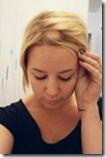Can Hair Loss be Caused by Stress?
 Hair loss can be caused by a number of factors, such as heredity, certain diseases, or hormonal imbalances, and stress can play a substantial role in triggering it. Both emotional and physical stress, especially severe, can work to affect the growth of hair weeks or months after the stressful event or a tense period in your life.
Hair loss can be caused by a number of factors, such as heredity, certain diseases, or hormonal imbalances, and stress can play a substantial role in triggering it. Both emotional and physical stress, especially severe, can work to affect the growth of hair weeks or months after the stressful event or a tense period in your life.
Generally, there are two types of hair loss caused by stress: telogen effluvium hair loss and alopecia areata. In the first case, which is more common, stress causes hair on certain scalp areas to suddenly enter the resting phase, or telogen effluvium, instead of continuing its healthy growing phase. As a result, the resting hairs start falling in large quantities in a few months after a stressful experience, such as illness, injury, or divorce. Telogen effluvium hair loss usually resolves by itself in about six to ten months. In the second case, stress makes blood lymphocytes attack hair follicles, which is followed by massive hair loss (alopecia areata) just weeks after the stressful event. Stress-induced alopecia areata has a recognizable pattern: hair starts falling suddenly from one area of the scalp leaving a distinct round parch of baldness and then hair loss slowly spreads on other scalp areas sometimes affecting the whole head and even body hairs (alopecia totalis). This type of stress-triggered hair loss is hard to manage and a medical intervention is often required. Arranging a consultation with a trichologist or a dermatologist is the best way to find out the true cause of your hair problems, as well as the best solution to treat them.
It has to be noted that a certain degree of hair loss is normal for healthy people - we usually lose from 100 to 150 hairs daily, or even more if we extensively use blow dryers, hair dyes and other chemicals used in hair processing, flat irons, or harsh shampoos. The average lifespan of a healthy scalp hair is about four - five years, after which it falls and is replaced by a new hair shortly after (sometimes within a term of six months). Tight hairstyles and other external factors can shorten the lifespan of the hair. Aging and hormonal changes caused by fluctuations in testosterone (mostly in men) and female menstrual cycles, pregnancy, breastfeeding, or menopause, are other common caused of hair loss. Stress, especially if combined with any of the above triggering factors, can make hair loss more severe and cause it to last longer. Another hair-affecting side of stress is related to the formation of so-called “nervous habits”, such as habitual pulling out and twisting of one’s hairs or nervous scratching of the scalp on a constant basis. Nervous habits can lead to partial or even complete baldness, and, in order to stop them, the intervention of a medical specialist is often required.
 If you suspect that stress can be the culprit of your hair loss, a good rule of thumb is to analyze your lifestyle and cut down on the amount of stress, whenever possible. If stress is caused by your job or family situation, maybe your should consider changing your career or your attitude to things around you. No matter what the reason is, try stress-coping techniques that would work well for you - for example, joining a yoga studio, practising meditation, or taking more time for relaxing walking, fishing, jogging, or spending more time with your friends. Remember, that stress-induced hair loss usually resolves by itself, but only if you balance your life and remove from it all causes of excess stress.
If you suspect that stress can be the culprit of your hair loss, a good rule of thumb is to analyze your lifestyle and cut down on the amount of stress, whenever possible. If stress is caused by your job or family situation, maybe your should consider changing your career or your attitude to things around you. No matter what the reason is, try stress-coping techniques that would work well for you - for example, joining a yoga studio, practising meditation, or taking more time for relaxing walking, fishing, jogging, or spending more time with your friends. Remember, that stress-induced hair loss usually resolves by itself, but only if you balance your life and remove from it all causes of excess stress.
Stefani Robbins
Posted on October 27, 2007
Filed Under Hair Loss Reasons
Comments
Leave a Reply
